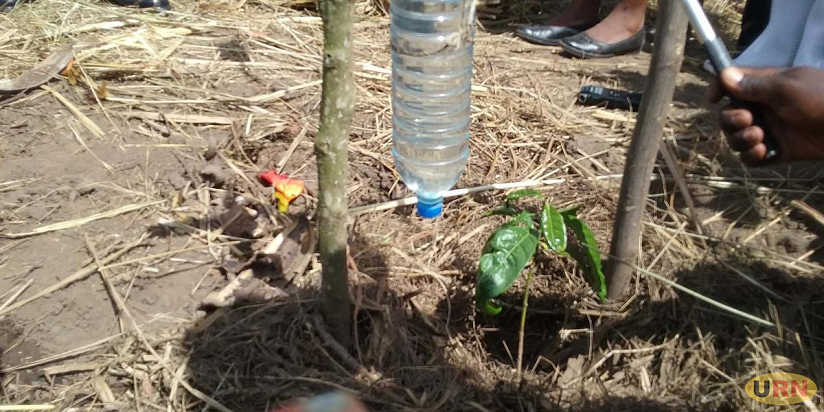Farmers in Luwero district have abandoned drip irrigation, a farming method introduced to them by president Yoweri Museveni five years ago, citing water shortage and labour costs.
Drip irrigation, sometimes called trickle irrigation involves dripping water onto the soil from small diameter bottles and pipes which are applied close to plants so that only part of the soil in which the roots grow is wetted. This
President Yoweri Museveni launched drip irrigation at his Presidential demonstration farm located at Kawumu village in Makulubita sub-county, Luwero District In 2016, and rallied farmers to embrace the method to save their withering crops. This, he said, was a temporal strategy to achieve food security and promised to construct a modern irrigation scheme for the community in Makulubita sub-county.
But, John Kibalama, the Chairperson of Bakyabumba Farmers’ Cooperative Society said that many of them had embraced Museveni’s irrigation method but they abandoned it later over the high labour costs involved and the water shortage in their communities.
Kibalama said they found difficulty in fetching water from distant areas and filling each bottle to irrigate the crops every day. Kibalama added that they also found it harmful for water to stay in the bottle all day and later irrigate it on a crop.
Robert Ssekweyama, a resident of Kigombe village says that he abandoned the bottle drip irrigation because it was labour intensive, yet, even after the effort, he failed to attract better yields.
Now, the farmers have embraced micro-scale solar and fuel-powered irrigation schemes promoted by the Ministry of Agriculture, Animal Industry and Fisheries. The micro-scale irrigation programme targets farmers growing crops between 0.5-2.5 acres of land.
Under the programme, the government contributes 25 per cent of total costs for solar equipment and its installation. At least 684 farmers have expressed interest in acquiring solar-powered irrigation equipment and Luwero district is already procuring kits for 65 farmers.
Christopher Tebandeke, a farmer at Nsozibirye village in Luwero says that the micro solar irrigation scheme is cheaper and involves no extra labour costs like other schemes. The farmers have since appealed to the government to make the solar-powered irrigations schemes more affordable and accessible to all farmers so as to increase productivity.
Luwero District Agriculture Officer Wilberforce Ssemigga has advised farmers to use any affordable method of irrigation in order to increase productivity. Ssemigga added that the district intends to enable 1,000 farmers to acquire micro-small irrigation kits but these will need to contribute at least 25 per cent of the total cost needed to purchase it.
Museveni promised to construct a modern irrigation scheme at Danze swamp in Makulubita sub-county but this is also yet to be fulfilled.
-URN





